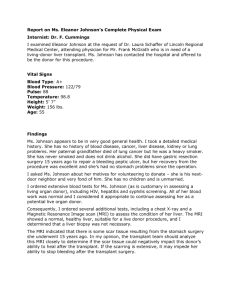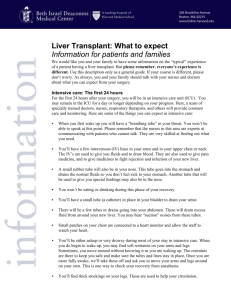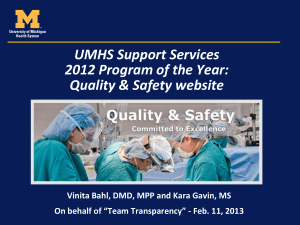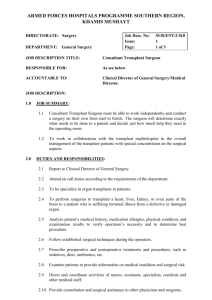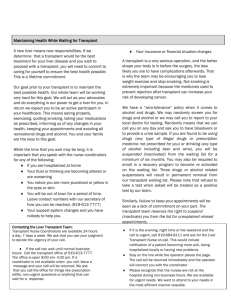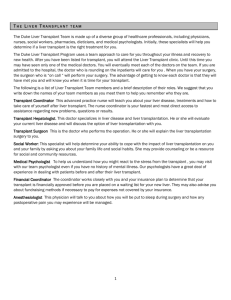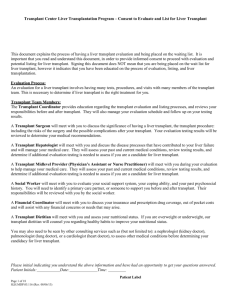Post-Liver Transplant: Patient Care Guide & Recovery
advertisement
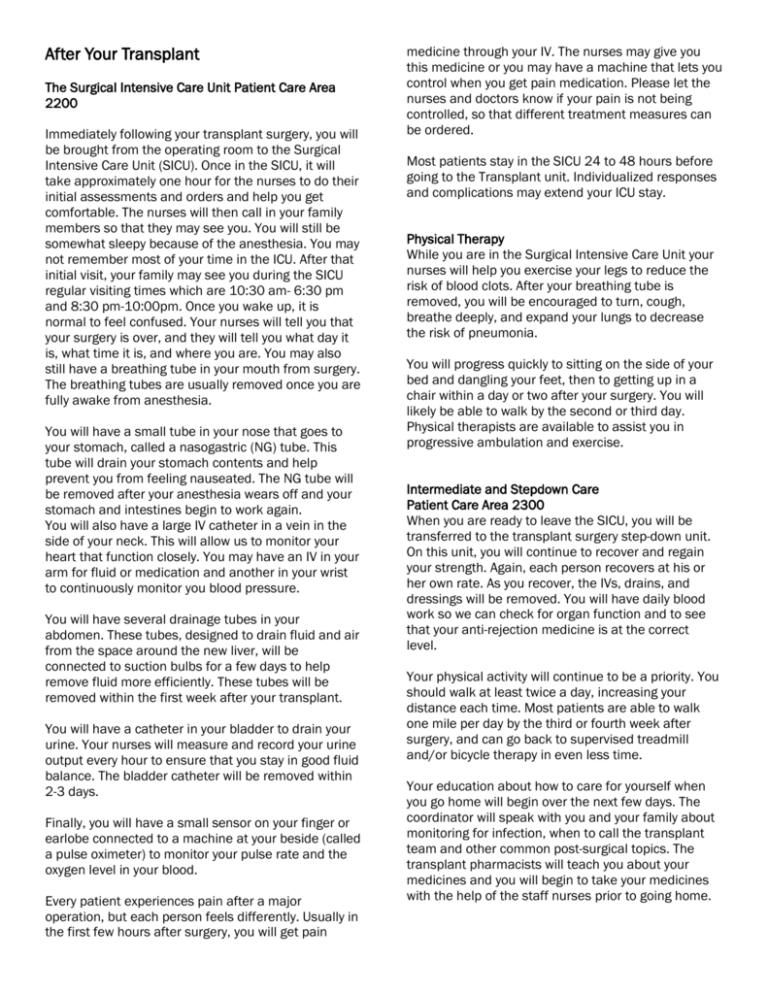
After Your Transplant The Surgical Intensive Care Unit Patient Care Area 2200 Immediately following your transplant surgery, you will be brought from the operating room to the Surgical Intensive Care Unit (SICU). Once in the SICU, it will take approximately one hour for the nurses to do their initial assessments and orders and help you get comfortable. The nurses will then call in your family members so that they may see you. You will still be somewhat sleepy because of the anesthesia. You may not remember most of your time in the ICU. After that initial visit, your family may see you during the SICU regular visiting times which are 10:30 am- 6:30 pm and 8:30 pm-10:00pm. Once you wake up, it is normal to feel confused. Your nurses will tell you that your surgery is over, and they will tell you what day it is, what time it is, and where you are. You may also still have a breathing tube in your mouth from surgery. The breathing tubes are usually removed once you are fully awake from anesthesia. You will have a small tube in your nose that goes to your stomach, called a nasogastric (NG) tube. This tube will drain your stomach contents and help prevent you from feeling nauseated. The NG tube will be removed after your anesthesia wears off and your stomach and intestines begin to work again. You will also have a large IV catheter in a vein in the side of your neck. This will allow us to monitor your heart that function closely. You may have an IV in your arm for fluid or medication and another in your wrist to continuously monitor you blood pressure. You will have several drainage tubes in your abdomen. These tubes, designed to drain fluid and air from the space around the new liver, will be connected to suction bulbs for a few days to help remove fluid more efficiently. These tubes will be removed within the first week after your transplant. You will have a catheter in your bladder to drain your urine. Your nurses will measure and record your urine output every hour to ensure that you stay in good fluid balance. The bladder catheter will be removed within 2-3 days. Finally, you will have a small sensor on your finger or earlobe connected to a machine at your beside (called a pulse oximeter) to monitor your pulse rate and the oxygen level in your blood. Every patient experiences pain after a major operation, but each person feels differently. Usually in the first few hours after surgery, you will get pain medicine through your IV. The nurses may give you this medicine or you may have a machine that lets you control when you get pain medication. Please let the nurses and doctors know if your pain is not being controlled, so that different treatment measures can be ordered. Most patients stay in the SICU 24 to 48 hours before going to the Transplant unit. Individualized responses and complications may extend your ICU stay. Physical Therapy While you are in the Surgical Intensive Care Unit your nurses will help you exercise your legs to reduce the risk of blood clots. After your breathing tube is removed, you will be encouraged to turn, cough, breathe deeply, and expand your lungs to decrease the risk of pneumonia. You will progress quickly to sitting on the side of your bed and dangling your feet, then to getting up in a chair within a day or two after your surgery. You will likely be able to walk by the second or third day. Physical therapists are available to assist you in progressive ambulation and exercise. Intermediate and Stepdown Care Patient Care Area 2300 When you are ready to leave the SICU, you will be transferred to the transplant surgery step-down unit. On this unit, you will continue to recover and regain your strength. Again, each person recovers at his or her own rate. As you recover, the IVs, drains, and dressings will be removed. You will have daily blood work so we can check for organ function and to see that your anti-rejection medicine is at the correct level. Your physical activity will continue to be a priority. You should walk at least twice a day, increasing your distance each time. Most patients are able to walk one mile per day by the third or fourth week after surgery, and can go back to supervised treadmill and/or bicycle therapy in even less time. Your education about how to care for yourself when you go home will begin over the next few days. The coordinator will speak with you and your family about monitoring for infection, when to call the transplant team and other common post-surgical topics. The transplant pharmacists will teach you about your medicines and you will begin to take your medicines with the help of the staff nurses prior to going home. You can expect to be discharged from the hospital within one to two weeks after your operation, but you may need to remain in Durham for another two weeks for frequent clinic visits. Remember that each person is different and your recovery depends on your progress or development of complications. Caring for yourself after transplant will have special considerations. These include: Medications: After a liver transplant, you will have medications to take for the rest of your life. These medications are very expensive and have some side effects. The financial coordinator will explain insurance coverage or limitations. If you have limited insurance coverage for medications, you will be asked to fundraise for your future costs. The Financial Coordinator will direct you to resources for fundraising. Duke Hospital is not able to provide medicines unless you are hospitalized. Monitoring: You will be asked to record your blood pressure, weight, temperature, and fluid intake and output each day. Healthy habits: After the transplant, you will be expected to maintain a well-balanced diet and exercise regularly to keep yourself in good physical condition. Frequent check-up: You will need to return to Duke frequently for outpatient tests and Liver Transplant Clinic visits. You must also be seen by your local physician to provide routine and acute care. Communication with the transplant coordinators about changes in your health before and after transplant is essential. Your Long-Term Outlook While a liver transplant represents a great hope for people with end-stage liver disease, various complications can occur after liver transplantation. These may include rejection, infection, technical complications and recurrence of original liver disease. During your hospitalization, we will teach you about your medicines, and how to monitor your incisions and drains daily. Often the first sign of liver dysfunction is seen in your lab work. That is why we ask you to come to the clinic frequently to monitor these values. Any changes in your liver function or other symptoms will be evaluated thoroughly. It is important that we carefully decide the cause of your symptoms so that we can treat you appropriately. While complications are always a possibility, it’s important to remember that the single most important factor in the outcome of your transplant is you. Liver transplantation is a lifelong commitment, one with lasting impact on every aspect of your existence. So take your responsibility seriously -- and take good care of yourself. The Duke Liver Transplant Team knows that going through a major medical procedure like this can be a trying time, and we want very much to help you through this process. Please let us know of any way we can help ease your confusion and anxiety. We look forward to working closely with you.
